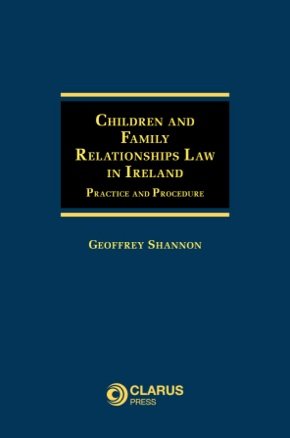About the Book
The Children and Family Relationships Act 2015 gives legal recognition to the many different and diverse relationships that exist in modern day Ireland. It is the most comprehensive amendment to the law on children and family relationships in many decades. The author, Dr Geoffrey Shannon, in Children and Family Relationships Law in Ireland: Practice and Procedure, examines, analyses and explains this new legal regime.
Children and Family Relationships Law in Ireland: Practice and Procedure addresses a wide-range of new issues. These include:
parental rights in diverse family arrangements;
parentage in cases of assisted reproduction;
the establishment of a national donor-conceived person register;
the “best interests” principle with regard to children;
joint adoption for civil partners/co-habiting partners;
access entitlements for a wider range of people;
defined maintenance provisions for civil partners and cohabiting partners living with a child for a certain amount of time;
provisions to help “make parenting work”;
the formalisation of the relationship between a child and their de facto parent.
Children and Family Relationships Law in Ireland: Practice and Procedure also addresses the six new different pathways to guardianship, expanding the duties, obligations and rights of guardians and thereby further bolstering the rights of children. For the first time, non-marital fathers cohabiting for a specified period with the child’s mother will be entitled to automatic guardianship.
Under the 2015 Act a parent or another eligible adult can apply to court for guardianship. An eligible adult is a person who is married to or in a civil partnership with a child’s parent, or has cohabited with the child’s parent for three years and shared responsibility for the child’s care for a two year period. Persons who have cared for the child for one year, where no other parent or guardian is able or willing to fulfil the rights and duties of the role, may also be eligible to apply for guardianship. This therefore allows foster parents and other adults who provide day-to-day care for children to apply for guardianship.
The Children and Family Relationships Act 2015 is far reaching and, as illustrated, fundamentally changes family law in Ireland. Children and Family Relationships Law in Ireland: Practice and Procedure is the first book to address the far reaching changes.
Content includes
PART I
Chapter 1: Introduction
Chapter 2: International Legal Framework
Chapter 3: Children’s Rights
Chapter 4: Parentage
Chapter 5: Guardianship, Custody and Access
Chapter 6: Dispute Resolution and Enforcement Orders
Chapter 7: Adoption
Chapter 8: Maintenance
Chapter 9: Civil Partnership
PART II: COMPREHENSIVE ANNOTATION OF 2015 ACT
Chapter 10: Children and Family Relationships Act 2015 Annotated
PART III: COURT RULES 2016 GUIDANCE (Comprehensive Annotation of Relevant Court Rules and Forms)
Chapter 11: District Court (Children and Family Relationships Act 2015) Rules 2016
Chapter 12: Circuit Court Rules (Children and Family Relationships Act 2015) 2016
Chapter 13: Rules of the Superior Courts (Children and Family Relationships Act 2015) 2016
